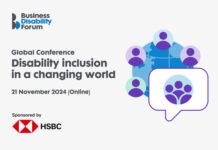US employees continue to strongly support workplace diversity, equity and inclusion (DEI) initiatives, despite growing political pressures and legal scrutiny, according to a new study.
The research from The Conference Board revealed that despite the ongoing backlash, nearly 60% of employees believe their organisation is dedicating the right level of effort and resources to DEI. This unwavering support highlights the value employees place on inclusive workplace policies, even as corporate diversity efforts face increased challenges.
Additionally, 58% of US workers say their company’s DEI efforts are appropriately resourced, while 21% believe these efforts fall short of what’s needed. The survey also found that DEI policies remain a priority for many employees, especially among women and Black workers, with nearly half of women (49%) and over half of Black respondents (56%) stating they would not work for a company that does not prioritise DEI.
DEI INITIATIVES ‘ESSENTIAL’
Allan Schweyer, Principal Researcher in Human Capital at The Conference Board, emphasised the importance of DEI in today’s workplace, stating: “DEI values and initiatives are essential for many US employees and continue to receive strong, positive feedback. Leaders should focus on what truly matters for their workforce and tune out the noise, as these initiatives are critical for attracting and retaining talent.”
The survey highlights various aspects of DEI policies and their impact on the workforce. They include:
- Widespread Fairness and Pay Equity Policies. About 81% of companies have established fairness policies and leadership support for DEI, while 76% have programmes that promote equitable pay and benefits. Additionally, 74% of companies have dedicated DEI leaders, ensuring continuous focus on inclusion.
- Positive Impact of Leadership and Compensation Initiatives. 63% of employees report a positive impact when executives actively communicate the importance of DEI, and 62% view equitable compensation initiatives positively.
- Mixed Views on DEI Metrics: While DEI goals are widely adopted, 52% of employees feel that measuring DEI targets has a neutral or negative impact, perhaps due to concerns over these targets being perceived as quotas.
OTHER KEY FINDINGS
Employees support DEI initiatives, with nearly a quarter expressing a desire for more.
- 58% say their organisation’s DEI approach is appropriate, but 21% say it is insufficient.
- 21% feel too much effort and resources are allocated.
Most companies have DEI initiatives that include fairness policies and equitable pay programmes.
- 81% say their company has fairness policies and executive leaders who actively promote DEI.
- 76% have programmes that promote equitable compensation and benefits.
- 74% have a dedicated DEI leader.
Employees find initiatives that emphasise the importance of DEI and fair pay the most impactful.
- 63% report a positive impact from executive leaders communicating the importance of DEI.
- 62% say the same for initiatives that promote equitable compensation and benefits.
However, they’re uncertain about the impact of measuring DEI objectives.
- 52% say that measuring DEI targets has a neutral or negative effect on their work experience. This may be due to concerns over whether DEI targets could be perceived as quotas and could unfairly advantage some groups over others.
Demographic differences shape employees’ views of DEI, with millennials showing the most support.
- Millennials: 52% say their organization dedicates the right amount of effort to DEI and 32% say their efforts are not enough.
- Gen X: 57% and 22%, respectively.
- Baby Boomers: 63% and 12%, respectively.
Employees consider DEI vital for workplace culture but are unsure about its impact on productivity.
- 71% of respondents say that DEI initiatives improve their sense of belonging.
- 62% say they enhance engagement.
- 59% say they help collaboration and retention.
- Only 43% believe DEI positively impacts productivity, with 17% seeing it as detrimental.
Nearly half of women wouldn’t work for a company that doesn’t take DEI seriously.
- 49% of women wouldn’t work for a company that doesn’t take DEI seriously compared to just 29% of men.
Women’s perceptions of DEI initiatives are more positive than men’s.
- 73% of women report a positive impact from equitable compensation initiatives compared to 51% of men.
- 71% of women report a positive impact from DEI workshops compared to 50% of men.
Black workers are more likely to perceive DEI efforts as insufficient.
- 56% of Black respondents said they would not work for a company that does not prioritise DEI, compared to 40% of White (non-Hispanic), 33% of Hispanic, and 33% of Asian respondents.
- 40% of Black respondents say their company’s current DEI efforts are not enough, compared to 19% of White (non-Hispanic), 25% of Hispanic, and 23% of Asian respondents.
TACKLING DEI BACKLASH
The survey also gathered insights from senior DEI, HR, ESG, and corporate citizenship executives. Findings indicate that DEI initiatives are under increasing pressure, for the following reasons.
The political and legal landscape for corporate diversity efforts is increasingly contested.
- 63% of surveyed executives view the political climate for DEI as very or extremely challenging.
- 63% say the 2023 Supreme Court decision on affirmative action negatively affected their DEI efforts.
Executives are bracing for persisting or intensifying scrutiny of their diversity initiatives.
- 69% expect scrutiny of DEI efforts to persist or increase in the next three years.
Most companies are revising their DEI terminology, but few plan to reduce their DEI communications.
- 53% say their company has adjusted its DEI terminology both internally and externally over the past year, with another 20% considering similar changes.
- They’re adjusting language to broader concepts like “inclusion,” “belonging,” and “engagement,” which are less prone to legal challenge.
- Only 9% of surveyed executives intend to scale back external DEI communications over the next year, and just 3% plan to do so internally.
DEI’S ROLE IN ENHANCING INCLUSIVE CULTURES
The survey also noted that 71% of employees believe DEI initiatives improve their sense of belonging, while 62% say DEI policies enhance engagement and 59% report benefits for collaboration and retention. However, only 43% feel DEI policies directly improve productivity, with 17% viewing DEI as potentially detrimental to productivity.
“While DEI initiatives can set the foundation for diverse perspectives and creativity, quantifying their impact on productivity remains challenging,” added Diana Scott, US Human Capital Center Leader at The Conference Board. She advised companies to document productivity improvements linked to DEI to better illustrate its business impact.
Click here to download the full report.




































